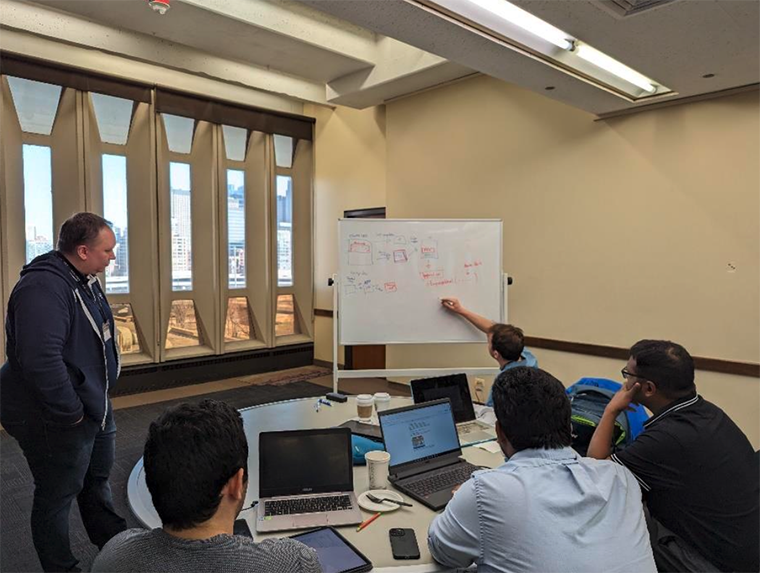Codeplay @ IWOCL 2024
08 May 2024
The Windy City of Chicago was host to the 12th iteration of the IWOCL conference in April 2024, gathering members of the SYCL and OpenCL communities from very different backgrounds. This conference is the perfect setting for Khronos working groups members, implementers and users to share their experience and knowledge, pushing the boundaries of what is achievable within these ecosystems.
SYCL itself has always been tightly linked to Codeplay, given its focus in our community as one of the main drivers of its development. This way, Codeplay was a proud sponsor of IWOCL 2024 and also put its grain of sand to organize the conference as a Khronos member.
The conference started on Monday with the HackFest session chaired by Intel's Sri Ramkrishna and sponsored by Intel and Codeplay. This year's HackFest was a great point of contact between users and SYCL experts including HackFest mentors Tom Deakin, from University of Bristol and SYCL Working Group Chair; Aksel Alpay, from Heidelberg University and creator of AdaptiveCpp; Thomas Applencourt, from Argonne National Laboratory and SYCL Advisory Panel Chair; and our own Hugh Delaney. We were glad to see more and more developers using SYCL in their projects and even porting their CUDA codebases to SYCL using existing semi-automatic tools. This is the case of SYCLomatic, whose adoption among developers signifies its viability and the improvements it has gone through in the last twelve months. This first session set the tone of collaboration and openness for the rest of the conference. As one of the highlights of the day, we were all witnesses of the partial eclipse taking place that day in the Chicago sky.


Tuesday was the Advanced SYCL Tutorial Day, presented by Aksel Alpay, Thomas Applencourt and Abhishek Bagusetty, from Argonne National Laboratory, and Codeplay's Hugh Delaney, who also chaired the tutorial. The tutorial covered advanced topics such as concurrency using in-order and out-of-order queues; using multiple devices within SYCL; using advanced SYCL features such as group algorithms, reduction operators and atomics; optimizing memory access patterns for GPUs; as well as using math libraries like oneMKL within SYCL. Attendees came from a diverse range of backgrounds, with many attendees being familiar with other GPU programming APIs such as CUDA or OpenCL. As such they were keen to discuss their experiences in developing SYCL applications. There was also plenty of open discussion where presenters of the tutorial, being either SYCL implementers or SYCL application developers, advised attendees on how to extract maximum performance from their SYCL applications, or resolve any issues they were facing. The SYCL tutorial was followed by a reception in which Khronos provided SYCL T-shirts and attendees could share their views and experiences.

The rest of the days of the conference, Wednesday and Thursday, were allocated for conference sessions. The first three slots were reserved for keynotes, in which OpenCL, SYCL and SYCL SC working groups could give the community an update on their progress throughout the year and what is to come. On the SYCL side, Tom Deakin shared ongoing plans for SYCL upstreaming to LLVM, gave an update on Intel's DPC++ as the first SYCL 2020-conformant implementation and hinted an upcoming SYCL version codenamed SYCL Next. Marking the anniversary of the SYCL SC announcement, Codeplay's Hugh Delaney and Víctor Pérez presented the ongoing efforts in the specification of a new Khronos standard for safety critical systems based on SYCL, which will enable heterogeneous computing on safety critical industries such as automotive or medical.
Among all of the many interesting talks, I would personally like to highlight a few of them:
- Evaluation of SYCL's Different Data Parallel Kernels, Marcel Breyer from University of Stuttgart, taking home the Outstanding Short Paper or Technical Talk Award and discussing performance differences when using different APIs for submitting kernels on DPC++ and AdaptiveCpp.
- AdaptiveCpp Stdpar: C++ Standard Parallelism Integrated Into a SYCL Compiler, Aksel Alpay from University of Heidelberg, on an stdpar implementation using SYCL.
- SimSYCL: A SYCL Implementation Targeting Development, Debugging, Simulation and Conformance, Fabian Knorr from University of Salerno, introducing SimSYCL, a new library-only SYCL implementation, and taking home the Outstanding Full Paper Award.
- SYCL Bindless Images, Sean Stirling from Codeplay, introducing an improved images API for SYCL.
- An Online Compiler for SYCL Kernels and Some Related Ideas, James Brodman from Intel, introducing DPC++'s exciting kernel compiler extension.
Best part is all of these talks are available in the IWOCL website and YouTube, both slides and video recording of the presentations. For a more in-depth look, feel free to take a look at the conference proceedings.
As usual, the IWOCL poster session lead to interesting discussion. Several posters told user stories on porting CUDA codebases to SYCL using SYCLomatic, such as Lessons Learned Migrating CUDA to SYCL: A HEP Case Study with ROOT RDataFrame, by Jolly Chen from University of Amsterdam and CERN, obtaining the Outstanding Poster Award. Codeplayers Victor Perez and Hugh Delaney also presented in-house developments on new SYCL features available as DPC++ extensions, bringing improvements to runtime instantiation of SYCL kernels via the new private_alloca API, and extensions to the SYCL 2020 host_task feature.

After this great experience in IWOCL, we can only thank once more the organizers for their great work bringing SYCL
people together once again and making our time in the city as easy as possible.
